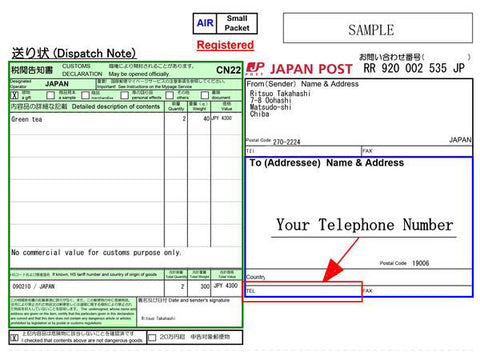FAQ
| Best Before Date |
|
・Best Before Date of my Matcha is strange. In Japan the Best Before Dates are written as year / month / day Our organic matcha are made for Japanese people. That is why the best before date are written in Japanese way. So you drink high quality organic matcha green tea Japanese people drink, not low grade matcha with English label ones. |
| Payment |
|
・Do I need to have my PayPal account? Yes, to avoid fraud, customers need to have their own PayPal account already. Please don't worry! It is very easy to make your own PayPal account. And it is Free to have the account! ・Another payment is okay? Yes, we accept Credit card payment, Apple Pay. |
| Delivery |
|
・How much does delivery cost? The charge for international delivery using this service is $9 USD for a shop of $35.99 USD or less. Free international delivery for a shop of $36 USD or over!
・How do you use my telephone number?
We will send a confirmation email once your product has been shipped. In this email there will be a link to a page where you can track the progress of your parcel. (Please note : In some counties, this system can work until your parcel arrives at Tokyo customs office in Japan.) For the US customers : Your parcel will be delivered by USPS. Once your parcel has arrived at a customs office in the US, you can use their tracking system and get more detailed tracking information. USPS.com With EMS option, this track system works in 45 counties worldwide.
・My parcel has not arrived / my parcel is damaged. In the event of any damage to your parcel, keep the parcel as you received it and contact your local post office. Then send us a notification email at Grace and Green. We will then contact the Japanese postal service to find out what happened to your parcel. If we find that you are eligible for compensation, we will immediately send another item free of charge.
· Will I be charged import fees on my order? If the total product value of your order exceeds the tax exemption level for your country, customs duty and other taxes may be levied. If you are in doubt, please contact your national customs office for more details. Please read more about Customs duties and Taxes. |
| Are Japan's crops safe? Worries about radioactivity and radiation |
|
After the disasters that struck Japan in March 2011, consumers in and outside of Japan have expressed concern over the potential of radioactive contamination in Japan’s crops. In order to alleviate these concerns, national and local councils have worked tirelessly to establish a series of tests to check the radiation levels present for all kinds of Japanese produce. At Grace and Green, we only use products that have undergone thorough testing to check their radioactivity levels and have been found to be completely free of any radiation contamination. Please use our products safe in the knowledge that they are boosting, and not damaging your health. |
|
About Matcha |
|
・How to make Matcha Tea, click here!
・Matcha for pregnant women, breastfeeding women and children Matcha contains caffeine. It is the best idea for them to avoid matcha just in case.
・How should I store my tea? It’s best to store matcha in the refrigerator even before opening, in order to prevent the tea from oxidising (the oxidisation process lowers the quality of the tea). Before opening, remove the tea tin from the fridge and open when the tin returns to room temperature (this minimises the danger of condensation forming in the tin). After use, firmly shut the lid of the tin. Store the tea in the refrigerator and consume within 2-3 weeks.
・How long will my tea keep? The ‘best before’ dates printed on our products only apply before the packaging has been opened. Once the tea has been opened, store it in the refrigerator and consume within 2-3 weeks.
・Why is matcha sold in such small quantities (20g, 40g)? Matcha begins to oxidise when the tea tins are opened, and this slowly degrades the quality of the tea. If we sold matcha in larger quantities, it would be difficult for you to get through the tin before the quality started to decline. In order to preserve the freshness of your matcha, the tea is sold in small quantities.
・Why does matcha come in a tin, rather than a packet? Packets of matcha are best suited for large scale use of matcha tea. It is harder to preserve the freshness of the tea inside a packet; a tin keeps tea fresher for much longer. For daily consumption, tinned tea is the best option. The only exception to this rule is our Healthy Green Tea Powder. The tea is best suited for cooking and is sold in a small packet because recipes often call for a greater quantity of tea than one would use when making a single cup to drink. We can provide the quantity of tea necessary for cooking by selling it in a packet, but the specially designed size means that you are still likely to use the contents before the tea quality lessens.
Green tea is best made with soft water. The worst kind of water for green tea is any kind of tap water containing chlorine. For this reason, we recommend using filtered water to make your tea.
・What does this logo mean?
As a measure to protect human health and the natural environment, the Ministry of Agriculture, Forestry and Fisheries has drawn up the Japan Agricultural Standards (JAS) for organic produce and organically farmed processed foods; only products that meet these standards can be marked with this JAS logo.
|



